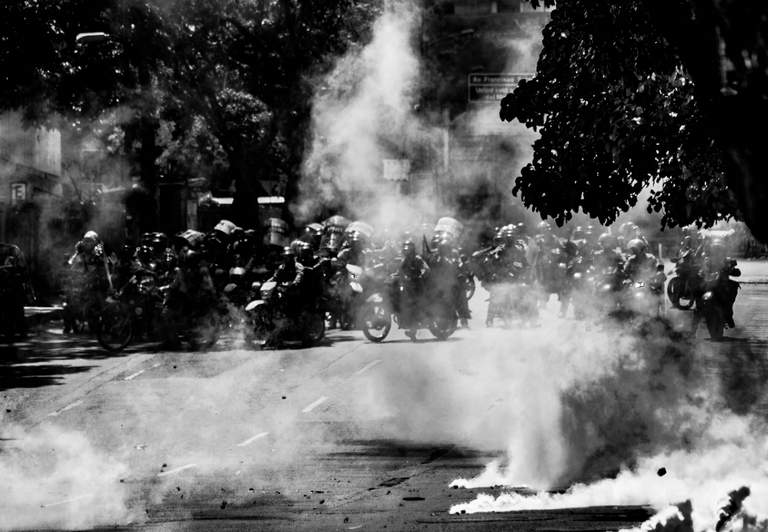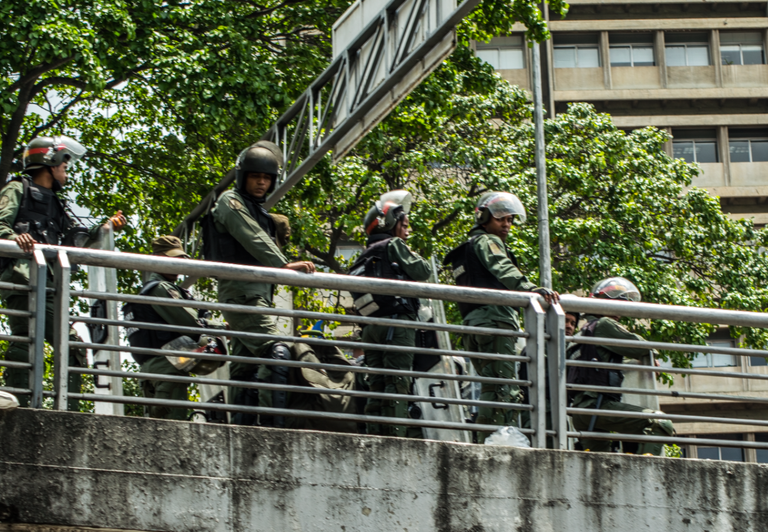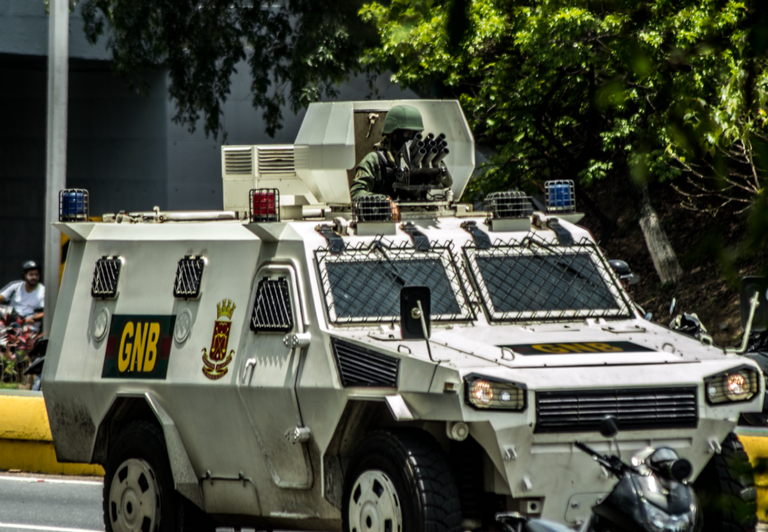
Here's the first part of this series, and you can also read my previous series on Venezuela's elections starting with this post.
When Chávez came to power, he ordered the creation of the "Círculos Bolivarianos" (Bolivarian Circles,) which were supposed to organize and support communities in sociocultural matters, but were in fact civilian militias armed by the government to protect the revolution at gunpoint if the need arose, and that's exactly what they did whenever there was a public demonstration against the government. Eventually, these informal armies became the "Colectivos" (Collectives) and have been used even more regularly by Maduro. Their job has consisted of instigating violence, intimidating dissidents, helping in their arrest or kidnapping them outright, and firing upon the crowds or against homes and buildings. For that, they had easy access to motorcycles and patrolled the streets from time to time, especially during electoral years, with a cacophony of claxons. They've always been paid handsomely for these tasks in cash to avoid any traces, and the bigger groups have gained a certain degree of territorial control over their areas of operation, causing no small amount of problems with local criminal gangs, with which they share many attributes. They're the shock troops, murderers and thieves just like the people they serve. They've never been taken to court for their crimes and probably never will, though many leaders and members have died in unexplained circumstances, a couple of them very publicly. Now several of these armed clusters have turned against the regime either openly or passively. Money's run out and they see less point in attacking fellow citizens, instead resorting to other activities; some have even begun to try and become legitimate organizations, directly contributing to their communities' infrastructure, education and commerce.
The next line of repression are of course the police units that have proliferated under chavismo. They have many names, SEBIN (the Secret Police), DGCIM (The Counterintelligence Bureau), the CICPC (The Scientific Police), the PNB (The National Bolivarian Police), the CONAS (The Counterterrorism Bureau) and others; some have split up into different groups over the years while others have been reabsorbed, changed their names or were eliminated. I would only confuse you if I listed all of them here. The reason why Venezuela's police and military force is so complicated is horribly simple: each of these bodies answer directly to at least one of chavismo's hierarchs, they may work together, be at odds with one another or even mix without recognizable boundaries. The process of admission and the training programs were systematically lowered across the board to allow more people, capable or not, to join the agencies. To make matters worse, individual authorities may hold posts in or work directly with other institutions and organizations simultaneously and clandestinely, so criminal gangs, colectivos, police and military bodies may share personnel, a National Guard may be a Secret Police Agent and/or a Lucero. In mafias and cartels, nothing binds people's loyalty as strongly as the fear of sharing unpunished crimes. This is another of the many effects of chavismo's corrupting influence, but in fact, they merely accelerated a preexisting process and were themselves, in many ways, spawned by that process.

All of these groups have been unleashed upon the civilian population in joint operations of fear and blood. We have death commandos sent to exterminate a whole criminal gang or a splinter cell of a security force, or just kill as many citizens as possible in a troublesome town. We have specialized kidnappers who work for the regime but also for the highest bidder, virtually the same thing; they vanish people who can be ransomed for money the same they vanish dissidents for political reasons. We have skilled torturers and stalkers, some of them foreigners. We also have hitmen who are paid thousands of dollars to get rid of a rival, a lover or a naughty gangster. David Placer, the man who did the research that I'm now breaking down in summary for you, managed to talk with a few men who were thus employed at one point or another by the government, personally by one of its members or by other wealthy private citizens connected to the halls of power. One of these hitmen used to be in prison and was let out only a few days to complete a job or two, and then return to prison. There have probably been many like him. You can imagine what this implies.
These organizations aren't truly delineated and separated, and they're not truly allies either, so they spy on one another, thwart each other and use their own intelligence, only crossing data as it becomes relevant for their bosses. In recent years, there have been literal gunfights among squads of rival police agencies and with criminal gangs over undisclosed matters that are almost invariably misreported to avoid scrutiny. This has further diminished the effectiveness of the authorities and eroded their operative capacity. which in turn has further lowered recruitment standards and so on and so forth. The more sickened the security apparatus becomes, the more brutal and hostile it turns, and although Venezuela's situation is indeed unique, most if not all countries in the world experience some of this degeneration. It's something to think about.

Something that I must note, however, is that not all military departments have actively engaged in repression because the regime feared that such an order would be disobeyed, creating an extremely undesirable crisis within the Armed Forces. The only group that has consistently been sent to repress the population has been the National Guard and even their leadership may no longer be willing to engage in that anymore. The same can be said of other institutions, particularly municipal police departments, all of which have been severely battered by internal purges ordered by this or that chavista chief, as well as by the country's inescapable crisis.
Coming next, a glimpse into the things that security forces have done to keep dissidence under control.